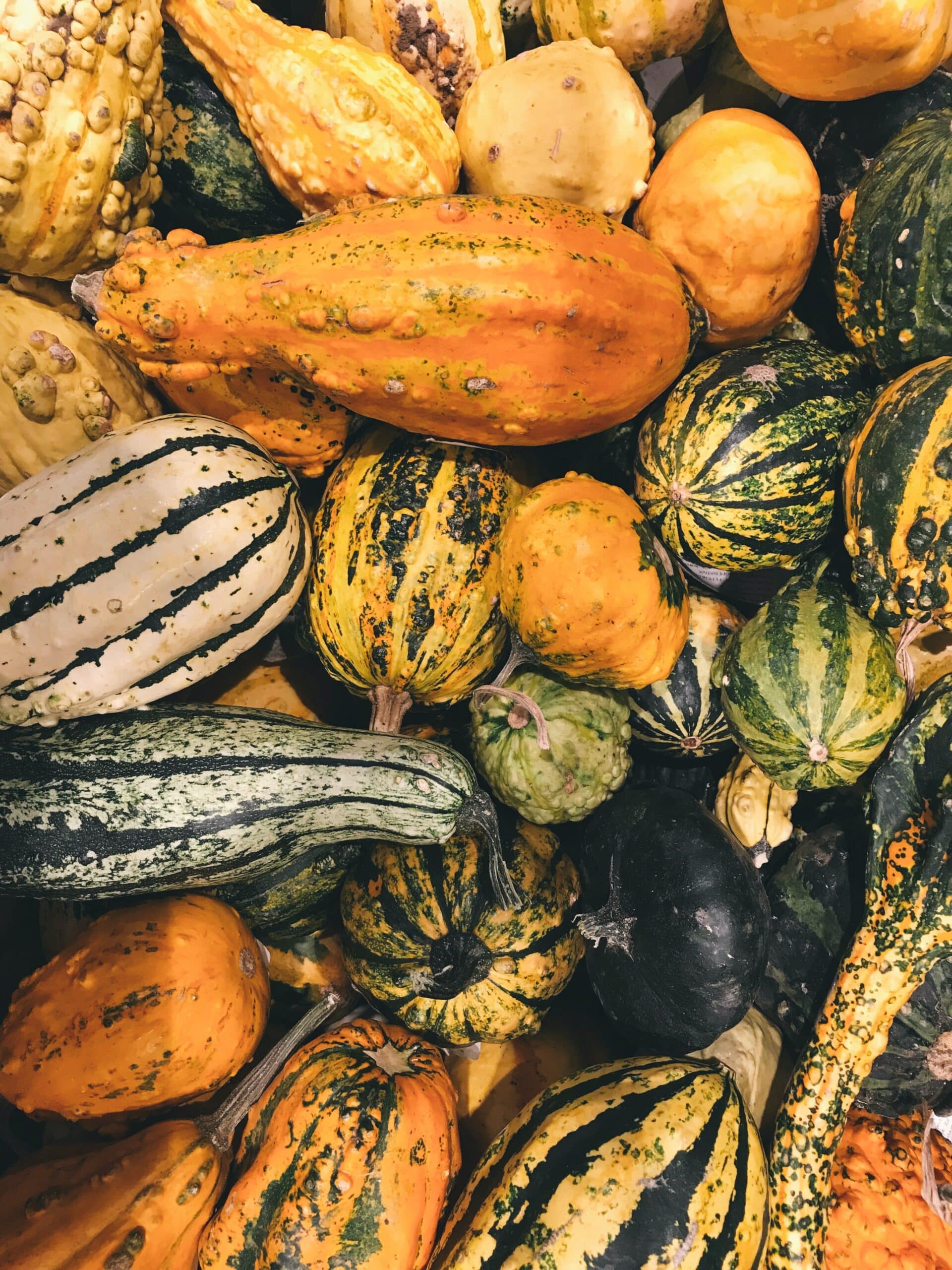Updated on April 9th, 2023
Delicata squash is a type of winter squash that has more flavor and less water content than other winter squash. It is also easier to peel and cut, which makes it an excellent alternative for many recipes where the butternut would normally be used. Also known as sweet potato squash for its brown sugar flavor, delicata tastes like a cross between fresh corn and pumpkin pie. They have an earthy taste that shares similar flavor notes to lemon zest and roasted sweet corn. Unlike some other varieties of squash, the delicata isn’t overly sweet, and its thin skin is edible.
Like all hard squash, delicata is high in beta-carotene and vitamin C, relatively low in calories, and astonishingly versatile. The delicata might not look like your traditional pumpkins or squashes from the outside. Still, once you start cooking with it, you will find out why this variety is becoming so popular in America these days.
Delicata squash is an excellent source of Carotenoids – beta carotene (a precursor to vitamin A), lutein, zeaxanthin; protein; vitamin C; vitamin B6; fiber; magnesium; and potassium.
Some Delicate Squash Recipes
Roasted Delicata Squash Salad: This healthy salad which combines spinach, pumpkin seeds, and ricotta Salata along with roasted delicata squash, is not only an eye-catcher but a tasty combo. It has delicate squash at the heart of its ingredients, and the winter squash is roasted for a more interesting crunch.
Pumpkin Pie: Delicata squash may be added to pumpkin pie for volume and a more interesting taste profile. The squash may be used with or without the skin, but generally, people prefer using delicate squash without its skin in this recipe.
Thai Red Curry with Delicata Squash: Japanese pumpkin and delicate squash steal the show in this spicy red curry, making a great one-pot vegetarian meal. The blend between delicata squash and the hot spices in this dish is one to remember.
Delicata Squash Substitute
If delicata squash is out of season or isn’t available in your part of the world, replacing them isn’t difficult. You’re about to discover a list of recommended delicata substitutes that’ll work nicely in any recipe.
Acorn Squash
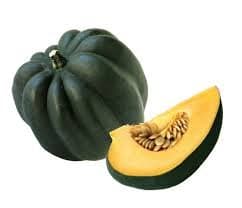
The acorn squash is our preferred alternative on this list. Its nutty flavor is mild with a low level of sweetness. The yellowish-orange flesh is tender, spongy, and also a little dry once cooked. This is an excellent option for baking and stuffing with your favorite ingredients.
Like the delicate, acorn squash has edible skin that can be left on the vegetable during cooking. You’ll notice that an acorn squash has dark green skin, which differs from a delicata’s yellow skin with thin green stripes. Their shapes are different, with the delicata being small and elongated while the acorn is much rounder and larger. The texture of acorn squash can be fibrous, which doesn’t make it an ideal candidate for soup.
Carnival Squash
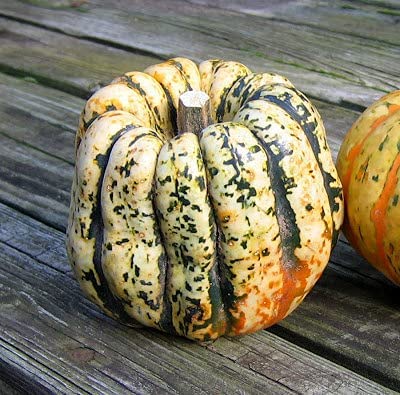
The carnival squash is another useful substitute that is excellent for stuffing. Unlike many winter squashes that can grow far too big, this variety is often small enough to halve, stuff, and serve individually. This squash’s skin is also relatively thin and can be left on during cooking. It adds color to a dish and nutritional benefits such as vitamin A, C, E, and fiber.
A carnival’s flesh is pale orange and has a firm, dry texture that is also somewhat coarse. Once cooked, the flesh has a rich, buttery flavor with a nutty undertone. It is delicious paired with lamb, pork, sausage, or other winter vegetables. Replace with an equal amount as you would delicata squash; however, the color profile of your dish will be tampered with.
Butternut Squash
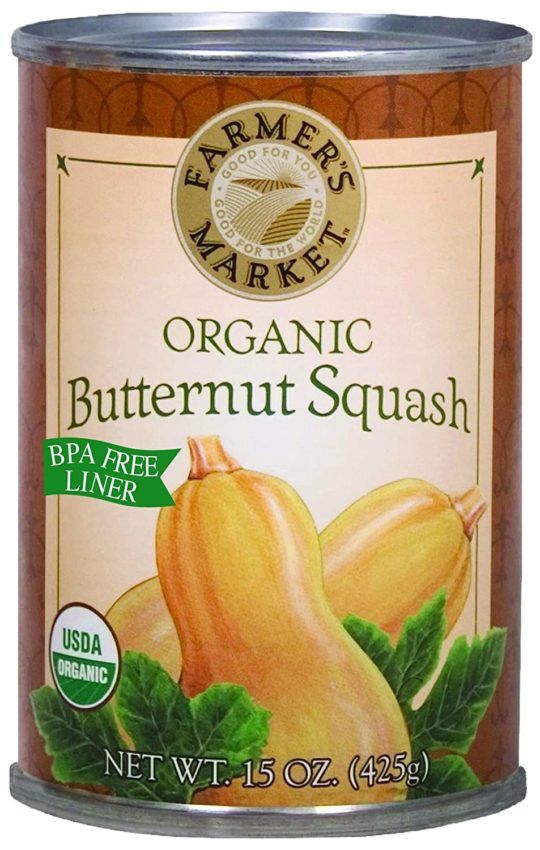
If you enjoy a sweeter-tasting squash, then butternut is an excellent choice. It is sweeter than the acorn or carnival varieties and provides a delicious creamy flavor with tender, smooth flesh. The butternut is a common type of squash that can usually be found in mainstream supermarkets. It offers excellent value for money as the seed area is smaller than most other gourds.
Use a butternut squash for making soups, purees, or dice the vegetable before roasting. It has a bulbous bottom with a slim neck and can be sliced lengthways and stuffed once the pulp is hollowed out. Butternut has tougher skin than a delicata, so many prefer to peel it before cooking. However, you’ll find that roasting softens its texture, making it more palatable.
Sweet Potato
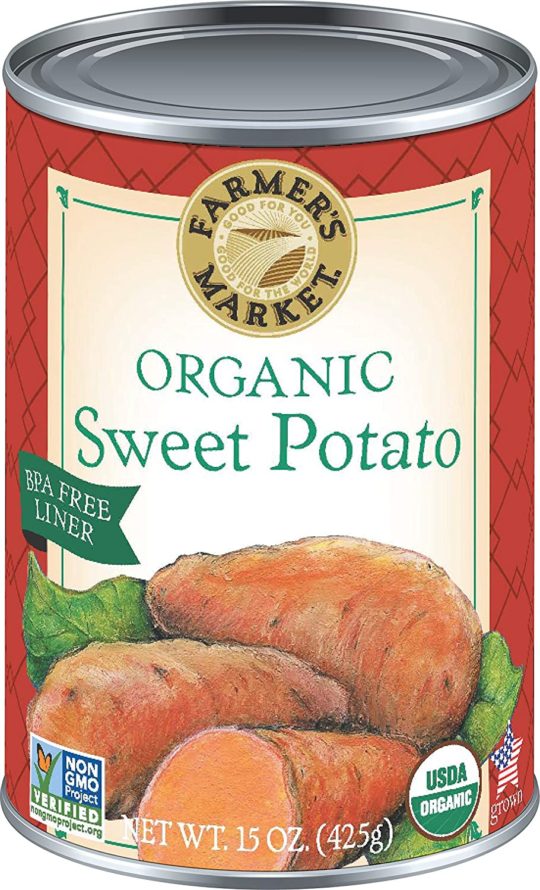
Sweet potato is the closest none-squash substitute for delicata squash. There are many different varieties that can vary in flavor, texture, and color. However, they mostly offer a similarly sweet, nutty flavor along with an earthy undertone.
You can use this replacement in many recipes that call for squash, including roasting, stuffing, or mashing. Its texture won’t mimic a delicata squash as it is starchier and not as soft, which you may prefer. The sweet potato is another healthy option that is rich in vitamin A and C, as well as potassium, iron, and fiber.
Spaghetti Squash
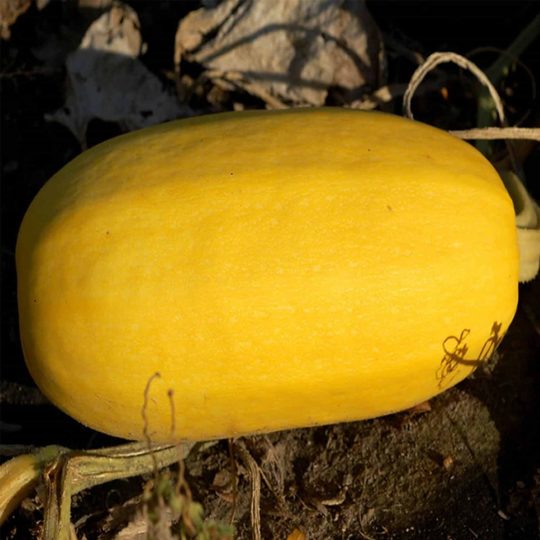
Many people are surprised to find out that Spaghetti Squash is a type of squash. They can be cooked and eaten just like spaghetti, as the name would suggest! It may be hard to believe, but this vegetable has fewer calories than pasta and more fiber. One cup of Spaghetti Squash contains only 42 calories, while one cup of regular spaghetti contains 200-300 calories.
This makes it an excellent food choice for those trying to lose weight or maintain their current weight. If you’re looking for a new way to spice up your dinner routine, try substituting delicata squash with Spaghetti Squash!
Frequently Asked Questions [FAQs]
Can I eat delicata squash skin?
Yes, you can. With the exception of delicata squash, other winter squash skin can get super tough, stringy, and impossible to rip apart. It’s the kind of textural villain that will ruin a dish, even when the squash itself is cooked perfectly. Delicata squash skin is tasty, nice, and softer.
Can delicata squash be poisonous?
Squash can contain a toxic compound called cucurbitacin E, which may cause cucurbit poisoning, also known as toxic squash syndrome, in people who ingest it. Although it can be quite serious, cucurbit poisoning is also very rare.
What is the healthiest squash to eat?
Yellow squash, also known as summer squash, packs a serious nutritional punch. It’s one of the healthiest squash available! Unlike delicate, yellow squash contains vitamin A, vitamin C, vitamin B6, folate, magnesium, fiber, riboflavin, phosphorus, potassium, and more.
Conclusion
Delicata squash is a seasonal recipe for the winter season; however, with this list of perfect substitutes, you can enjoy the same feel of delicate squash in your recipes all year. Consider the consistency and taste profile of the substitute you finally decide on, for some of them are sweeter than delicate squash.
